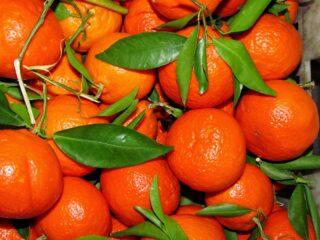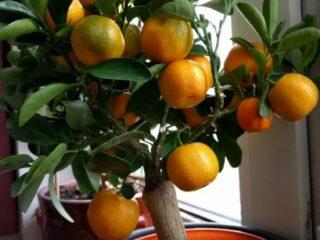Content
The benefits of tangerine seeds have long been appreciated by humanity. And although most people are unfamiliar with the exact composition, this does not prevent them from regularly eating the fruit. To evaluate the benefits of tangerine seeds and pulp, you should study their properties. It must be taken into account that seeds not only have a beneficial effect on the body, but can also be harmful to humans.
Is it possible to eat tangerine seeds?
This product is permitted for use within reasonable limits. It should be borne in mind that the seeds contain substances that, under certain conditions, can harm the human body.
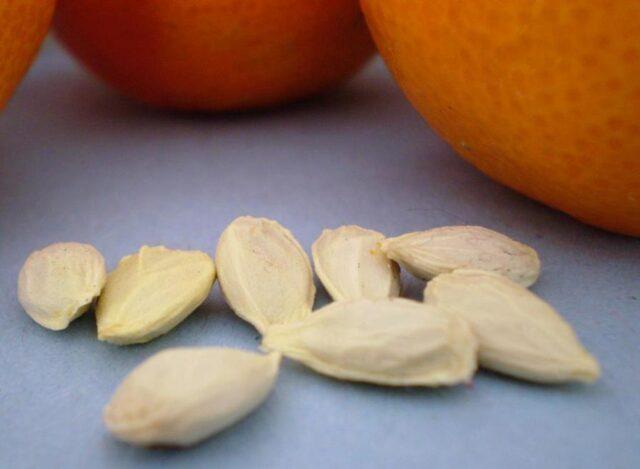
Tangerine seeds taste bitter and leave an unpleasant aftertaste
Chemical composition
Tangerines contain 8-10% carbohydrates and only 1% proteins and fats. Dietary fiber is present in the pulp in the same amount. The remaining main component is water. The calorie content of citrus fruits is 30-40 kcal per 100 g.The same amount of pulp contains only 2 g of fiber. This component is valued because it does not break down into components in the stomach, but safely absorbs all toxins and lipoproteins, and then removes them from the body.
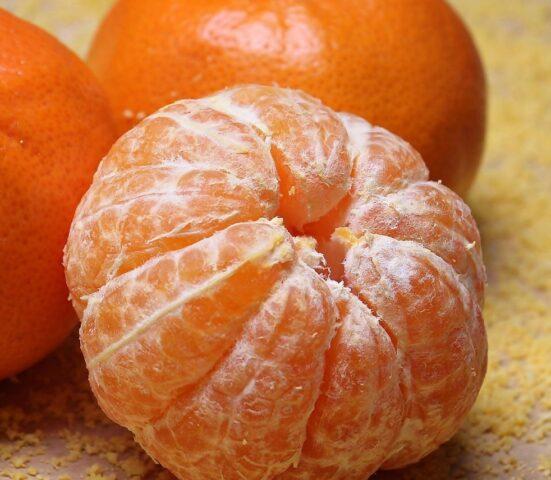
The average weight of a tangerine depends on the variety and varies within 100 g
The fruit contains many useful vitamins and minerals. The highest content of ascorbic acid in the pulp. Vitamins of group B, PP and phosphorus, beta-carotene are also present. It is the latter substance that provides tangerine with such an unusual bright color.
Unique oils are contained precisely in tangerine seeds. They contain substances such as alpha-tocopherol acetate and phytosterol. The seeds are rich in mineral compounds and unsaponifiable fractions.
Among the substances that cause concern among scientists, amygdalin glycoside is isolated in the seeds. This substance is toxic. It is important to understand that when pressing the seeds, amygdalin glycoside enters the oil, but in safe quantities. The finished product is intended for external use.
Tangerine seeds also contain components such as palmitic oil, oleic and linoleic acid. Their purpose is to form a protective film that serves as a barrier. They are able to suppress unwanted microflora.
The benefits of tangerine seeds
Reasonable consumption of fruit has a positive effect on the functioning of the body as a whole. The rich chemical composition allows a person to compensate for the lack of nutrients and minerals.To get the maximum benefit from the fruit and its seeds, you need to regularly consume the fruit in small quantities.
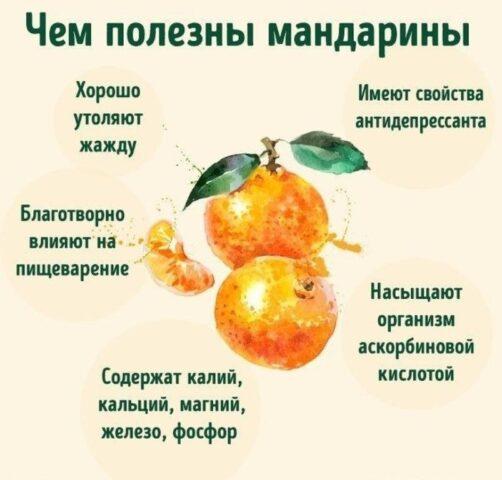
In the absence of an allergic reaction, a person can eat up to 5-6 tangerines a day daily
Antioxidant content
The action of these substances is aimed at neutralizing and absorbing released radicals. A metabolic byproduct in large quantities can affect cells, damaging them. This can lead to the development of serious illnesses.
Antioxidants in tangerine seeds have a beneficial effect on the liver, accelerating the processes of cleansing and self-healing.
Prevention of cancer development
A substance such as polyphenol helps prevent the development of cancer. Tangerine seeds cannot cure cancer, but if they are regularly consumed with pulp, the risk of tumor formation is reduced.
Strengthening the heart and blood vessels
The potassium and sodium content in fruits allows the body to direct its forces to normalize blood pressure. The presence of glycosides, vitamins C and B in the seeds and pulp is a guarantee of normalization of the functioning of the heart organs. With regular use, the risk of developing pathologies such as heart attack, stroke or ischemia is reduced.
Thiamine and potassium have a positive effect on the cardiac system, improving myocardial activity and preventing the accumulation of excess fluid. This helps reduce swelling and prevents hypertension.
Vitamin K has a beneficial effect on the elasticity of the walls of blood vessels. This will not only protect the body from atherosclerosis, but also prevent the development of varicose veins.
Scientists have made the discovery that bioflavonoids contained in tangerines also fight cholesterol plaques.They prevent obesity and prevent the development of diabetes.
Skin and hair health
It is in cosmetology that tangerine seeds are valued. The oil from them is very expensive, as it is difficult to obtain. But the benefits outweigh the costs.
The oleic acid included in the composition is an integral component of the protective layer of the dermis. It prevents moisture loss. In combination with other polyunsaturated acids, it slows down the aging process. To achieve maximum effect, regular cosmetic procedures are required.
Linoleic acid is a kind of regulator of the functions of the glands responsible for the production of sebum. This component from tangerine seeds relieves inflammation well.
Polyunsaturated acids are also important for hair; together with Omega-9, they regulate the permeability of the lipid layer in the follicles. This helps prevent their fragility and splitting.
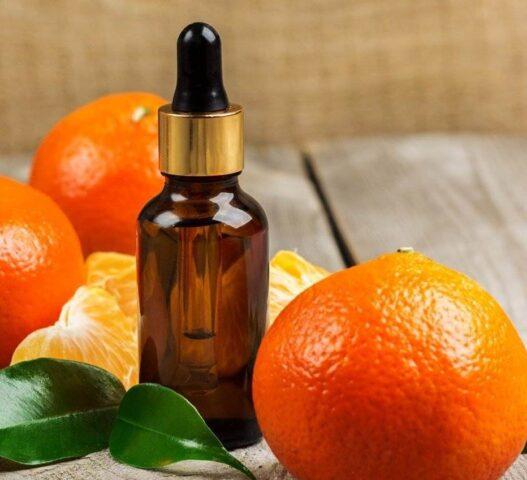
The most popular medicinal form made from tangerines is oils
Vitamin C, contained in the seeds and pulp, not only strengthens the immune system, but is also an active participant in the formation of collagen. This protein is responsible for the condition of skin and hair.
And retinol and vitamin B are actively used to treat acne and acne. Tangerine oil can also be used to speed up the healing of injured skin.
Strengthening the nervous system
Initially, the fruits help cope with stress and depression only by their appearance. The bright peel and specific aroma help normalize mood. Eating the fruit also has a beneficial effect on the nervous system: a person gets pleasure and enjoys the taste.
From a chemical point of view, thanks to their mineral and vitamin composition, tangerines reduce anxiety and promote better sleep. This is due to the fact that B vitamins are responsible for normalizing the functioning of the nervous system, and ascorbic acid regulates the functioning of the adrenal glands. They produce the stress hormone cortisol.
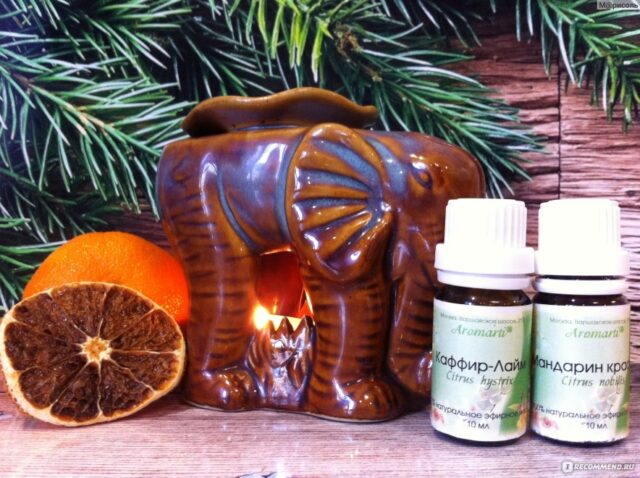
One of the simple ways to calm the nervous system is to add a few drops of tangerine seed oil to an aroma lamp.
Harm of tangerine seeds
Despite the many beneficial properties, there are categories of people who should avoid buying these fruits.
Tangerines are prohibited for patients with exacerbation of nephritis, hepatitis and cholecystitis. It is better for people suffering from inflammatory diseases of the stomach and intestines to give up the fruit. Doctors recommend eating tangerines with caution in patients with enteritis or colitis, gastritis with high acidity. Eating fruits will only provoke irritation of the mucous membranes of the gastrointestinal tract. For the same reason, healthy people are advised to avoid eating fruit on an empty stomach.
The second serious consequence of introducing tangerines with seeds into your diet is the risk of developing allergies. There is a possibility of rash, oral swelling and anaphylaxis.
Tangerines are harmful to people with diabetes due to the high carbohydrate content in the pulp.
Conclusion
The benefits of tangerine seeds outweigh the harm when a person consumes the fruit in reasonable quantities. If you eat several tangerines a day, it will help your body get useful minerals and vitamins.The seeds should not be eaten separately because they contain hydrocyanic acid, which is dangerous to humans.


